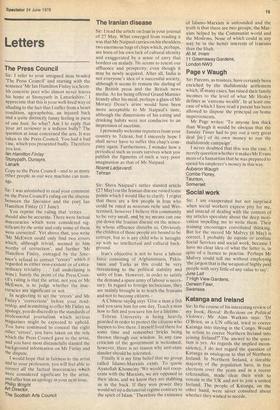The Press Council
Sir: I refer to your unsigned item headed `The Press Council' and starting with the sentence 'Mr Ian Hamilton Finlay is a Scottish concrete poet who almost never leaves his home at Stonypath in Lanarkshire.' I appreciate that this is your well-bred way of alluding to the fact that I suffer from a heart condition, agoraphobia, an injured back and a quite distinctly funny feeling in parts of one foot. So what? Am I to reply that Your art reviewer is a tedious bully? The question at issue concerned the arts. It was taken to the Press Council. You had a bad case, which you presented badly. Therefore You lost.
Ian Hamilton Finlay
Stonypath, Dunsyre, Lanark Copy to the Press Council — and to as many Other people as our wee machine can manage.
Sir: I was astonished to read your comment on the Press Council's ruling on the dispute between the Spectator and the poet Ian Hamilton Finlay (17 June).
You reprint the ruling that `critics . . . Should also be accurate. There were factual inaccuracies which were considered sig
nificant by the artist and only some of them were corrected'. Yet above that, you write 'Mr McEwen could only find two errors which, although trivial, seemed to him worthy of correction', and further `Mr Hamilton Finlay, outraged by the Spectator's refusal to—correct "errors" which it •
regarded as either non-existent or of extra ordinary triviality . . (all underlining is
mine). Surely the point of the Press Council's ruling is that the artist, not you or Mr McEwen, is to judge whether the inaccuracies are significant or not.
In neglecting to set the `errors' and Mr inlay's `corrections' before your readership, and in omitting to offer Mr Finlay an apology, you do discredit to the standards of Professional journalism which serious Magazines might be expected to uphold. You have continued to conceal the eight
Other. 'errors', you have taken on the role Which the Press Council gave to the artist, and you have most distastefully slanted the background information on Mr Finlay and the dispute.
I would hope that in fairness to the artist and to your profession, you will feel able to
correct all the factual inaccuracies .which were considered significant by the artist, and offer him an apology in your next issue. Philip Wright Art Director, The Scottish Arts Council














































 Previous page
Previous page